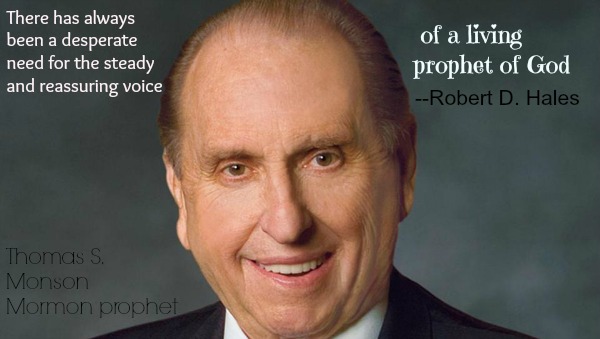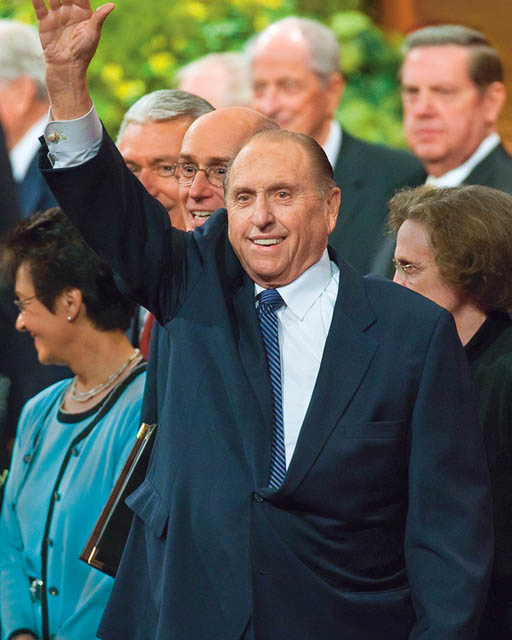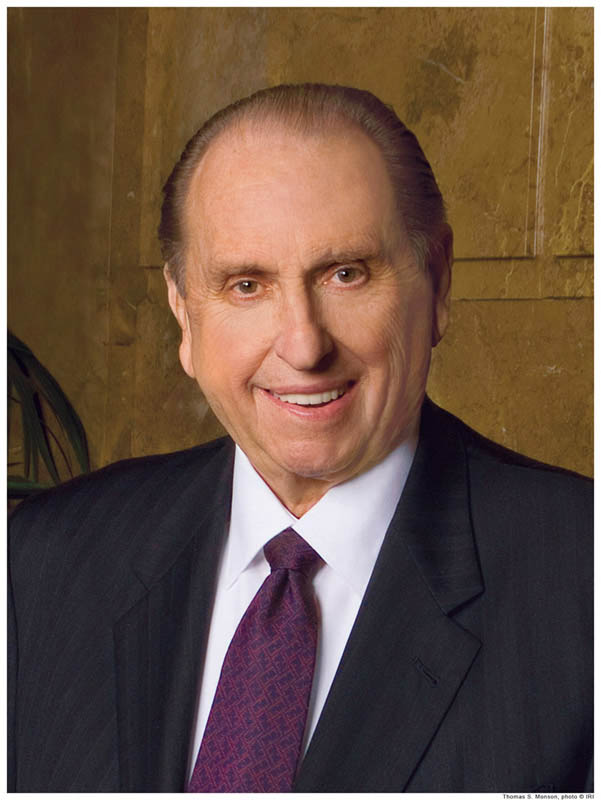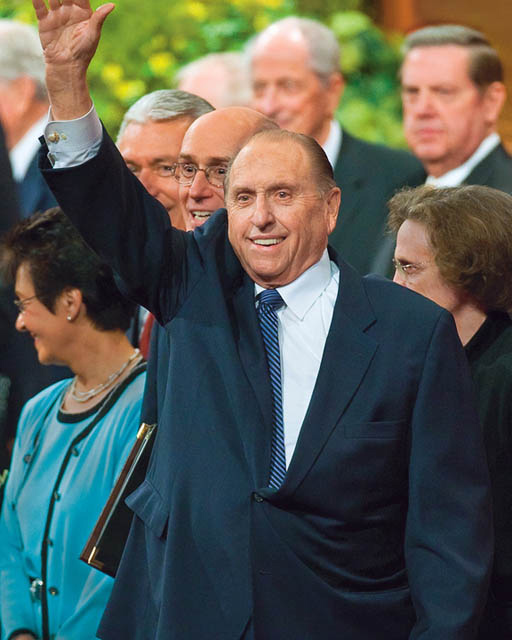Recently, Huffington Post ran a blog entry by Christian Piatt on the 5 traits of a false prophet. While it can be useful to know what a prophet is not, it is even more useful to be able to identify what a prophet is and how to know when you’ve really found one. As a Mormon, Christian’s list interested me. You may know that Mormons believe God restored prophets to the earth and that a prophet heads our church.
Before we dive into Piatt’s article, let’s take a fast look at the Mormon view of what a prophet is. First, Mormon is a nickname for members of The Church of Jesus Christ of Latter-day Saints and, contrary to popular opinion, the Book of Mormon isn’t our Bible. Mormons believe both books are scripture. Both books also contain the writings of ancient prophets, so Mormons spend a lot of time on the subject of prophets.
LDS.org, the official Mormon website for members of the Church defines a prophet this way:
Like the prophets of old, prophets today testify of Jesus Christ and teach His gospel. They make known God’s will and true character. They speak boldly and clearly, denouncing sin and warning of its consequences. At times, they may be inspired to prophesy of future events for our benefit—LDS Study by Topic.
 True prophets won’t be found on television summoning the spirits of the dead or telling fortunes. They won’t be doing that privately, either. Instead, their responsibility is to testify of the Savior and His gospel and to learn and share God’s will for the Church and for His children. It’s not a glamorous job, especially since it also involves leading the Church, but it is an essential one that has existed since the beginning of life on earth.
True prophets won’t be found on television summoning the spirits of the dead or telling fortunes. They won’t be doing that privately, either. Instead, their responsibility is to testify of the Savior and His gospel and to learn and share God’s will for the Church and for His children. It’s not a glamorous job, especially since it also involves leading the Church, but it is an essential one that has existed since the beginning of life on earth.
What Does a Prophet Do?
To understand the importance and work of a prophet, we can look to the Bible. “Surely the Lord God will do nothing, but he revealeth his secret unto his servants the prophets” (Amos 3:7). From this verse we know that prophets are essential. In order for God to operate His Church, He must have a prophet who can receive truth and instruct the membership. This verse helps us to know that if there is no prophet, God’s church isn’t on the Earth at the moment.The prophet speaks for God. When He speaks, it is as if God were speaking, although this applies only when He is speaking as a prophet. So, for instance, if the prophet says Brigham Young University will win the football game this week, he is not speaking as a prophet. Real prophets don’t predict football games, because they have no impact on God’s Church, and so this is merely His opinion.
The Bible shows us that prophets are ordinary people given extraordinary assignments. They came from all walks of life before becoming prophets. They often had no special theological training. What they had was faith and a willingness to do whatever God told them to do. They were not perfect, even after they received their calling. They were people—but people of great faith.
Before he became the prophet of The Church of Jesus Christ of Latter-day Saints, Ezra Taft Benson talked about the role of a prophet. He spoke specifically of Joseph Smith, the first prophet in modern times. President Benson wrote:
“A revealing characteristic of a true prophet is that he declares a message from God. He makes no apology for the message, nor does he fear for any social repercussions which may lead to derision and persecution.” (See Ezra Taft Benson, Joseph Smith: Prophet to Our Generation, General Conference of The Church of Jesus Christ of Latter-day Saints, October 1981.)
Prophets and Popular Culture
Interestingly, Piatt also said a true prophet says things that are true, but not always popular. This is a common theme among Mormons, and one other people sometimes have a hard time understanding. Often, Mormons will be told their church needs to modernize its views and to do a better job of fitting in with the times. They don’t usually mean things like accepting technology (which Mormons are very good at already). They want the Mormons to adapt to changing moral standards. If something is “in” today, Mormons are supposed to alter truth to fit the teachings of the popular crowd, so to speak. Then, if the “in crowd” changes its mind tomorrow, we ought to do the same.
The problem with this sort of teaching is that it doesn’t require a prophet. For that matter, it doesn’t require a God. Who needs a God if everything will be decided by votes, movie stars, magazines, or other measures of popularity? God’s truths are based on eternal principles, not ever-changing standards made by mankind.
Over the generations, we’ve found that letting popular vote choose morality has not been very successful. Divorce has increased so much it is nearly the norm instead of the unusual occurrence. More and more children are in foster care or aborted because their parents couldn’t or wouldn’t care for them. More children are born out of wedlock and more are growing up without a father or a mother. People are increasingly unhappy. The “new” morality is not bringing them what they seek.
Sheri L. Dew, a former Mormon leader at the international level and now the CEO of Deseret Books, said:
“Several years ago, I participated in an international policy forum where the discussion moved from prostitution to pornography to abortion and so on. When the moderator invited me to comment, I noted that it seemed impossible not to notice a common theme—that every thorny issue had immoral underpinnings. I then told about my parents, who are devout members of our faith, what they had taught me about marriage and chastity, and how those teachings had governed my life. Afterwards, one woman after another pulled me aside and said the same thing: “You are so lucky. I didn’t think chastity was even possible. I wish someone had told me this years ago—it would have changed my life.”
I personally know tens of thousands of youth and young adults who are living morally clean lives. They are happy, productive, and anxiously engaged in becoming engaged. Moral purity is not outdated. Admittedly, it is also not easy. But I submit that it is easier than the alternative. Virtuous men and women never worry about a surprise pregnancy or sexually transmitted disease. Never agonize over confessing unfaithfulness. Have no emptiness after a one-night stand. No pain in losing one’s family to infidelity. No haunting memories of indiscretions. Quoting C. S. Lewis, “Virtue—even attempted virtue—brings light; indulgence brings fog.” (Sheri L. Dew, “The Power of Virtue,” Church News, August 9.)
Should a Prophet be perfect?
Piatt felt a prophet should not have false perfection. He said many felt no one would want to emulate them if they were perfect. The Bible is very open about the imperfections of its prophets. They were seldom glamorous. Moses stuttered so much (or possibly couldn’t communicate in the vernacular of the Hebrews) God allowed him to have a spokesperson. Despite this, he was a great prophet who is often held up as an example.
Sometimes people will attack Mormonism by noting that its leaders are not perfect. They never pretended they were. As Piatt may have understood, a prophet who is clearly human is actually easier to follow. We find it much easier to identify with someone who is more like us. Mormons teach that Jesus Christ was the only perfect person.
The current Mormon prophet, Thomas S. Monson, is not the glamorous sort of person Piatt complained of in discussing the false prophet that sparked his article. He is an elderly man who has clearly never had plastic surgery. His suits are modest and not flashy. He is known for his cozy style. The stories he tells when he speaks are often of his own imperfections—the time he ignored a prompting, for instance, or his incompetence in the kitchen. In a recent conference, he shared the story of a time he and his friend, at age eight, disobeyed family rules about playing with matches and started a fire the community had to help put out. He does not expect us to see him as perfect. While he has certainly reached a level of obedience to God’s commands that is impressive, he wants us to understand he is still mortal, and therefore imperfect. A true prophet is humble enough to be admit he is an imperfect human being and still growing, as we all are. To me, that makes him a far better role model.
Piatt brings up interesting points about authority and hope. I’m sure he’s not entirely in agreement with me on this subject, but Mormons do believe a prophet must have the proper authority. Piatt didn’t make any suggestions as to how a prophet would gain authority, but Mormons do. As we study the Bible, we see that no prophet became a prophet because he decided to be one. In fact, many of them tried to talk God out of it when the call came. However, God called them and authorized them to carry out his work. Mormons believe their own prophets serve under the authority given to them by God.
Now, many ask how we know President Monson really is the prophet. We know in exactly the same way the people of the Bible knew. They were not present when the call came and God didn’t appear to them to tell them. Every person must find out for himself who the prophet of God is. We have the ability and the responsibility to pray to know what is true, as is taught in James 1:5. Once we have that confirmation from God, we have a personal responsibility to follow the prophet.
Do Mormons Follow the Prophet No Matter What?
When people hear that Mormons follow their prophet, they picture mindless obedience to every command, no matter how trivial or dangerous. This is not how it works for Mormons. First, as I said above, the prophet teaches about things that matter to God, so many things are outside the scope of his job. Secondly, as I also mentioned, we (the lay members) have the ability to confirm anything at all with God.
When I was investigating the Church, I prayed to know if the prophet—then Spencer W. Kimball—was really a prophet. Being new to the idea of prophets, I didn’t entirely know how it worked, so I wasn’t always sure what was doctrine and what was opinion. I sometimes struggled with something that was different than I’d assumed it would be. When that happened, I prayed about the specific doctrine in question. Eventually, I realized God always confirmed that the prophet was right and I didn’t find a need to do that very often. Once in a while, I have a chat with God about something, though, even today. I’m not embarrassed to do that. It’s what He expects me to do. A true prophet is not afraid to have his followers confirm his teachings with God.
It’s not blindly following if I’ve gotten a sure witness from God. In the same way I don’t have to touch every hot stove to prove it is dangerous to touch a hot stove, I no longer need to pray about every single word the prophet says. It is learning by experience and testing, not blind following.
Hope
Piatt seemed to have some problems with the issue of prophets offering hope. I’m not entirely sure of his intent with that one, but he mentioned, critically, that promises of a better life always required you to do something. That seemed a bit odd to me. After all, how else do we improve our lives except by changing something in them? A person who hopes to escape poverty will get more education, improve his skills, and begin doing the kinds of things that lead to good employment. A person who hopes for love will become the kind of person who is lovable. A person who wants eternal life will work to become the kind of person who is worthy to be in the presence of God for eternity.
God’s promises, throughout the Bible, always require us to do something to receive the blessings. We’re told that if we pay tithing, God will open the windows of heaven to pour out blessings. Mormon prophets do offer hope—but yes, you have to make wise choices in order to receive the promised blessings.
In a powerful sermon on hope, President Dieter F. Uchtdorf, second counselor to the Mormon prophet, defined hope from a religious perspective:
Hope is not knowledge, but rather the abiding trust that the Lord will fulfill His promise to us. It is confidence that if we live according to God’s laws and the words of His prophets now, we will receive desired blessings in the future. It is believing and expecting that our prayers will be answered. It is manifest in confidence, optimism, enthusiasm, and patient perseverance.
In the language of the gospel, this hope is sure, unwavering, and active. The prophets of old speak of a “firm hope” and a “lively hope.” It is a hope glorifying God through good works. With hope comes joy and happiness. With hope, we can “have patience, and bear … [our] afflictions” (President Dieter F. Uchtdorf, The Infinite Power of Hope, General Conference of The Church of Jesus Christ of Latter-day Saints, October, 2008).
About Terrie Lynn Bittner
The late Terrie Lynn Bittner—beloved wife, mother, grandmother, and friend—was the author of two homeschooling books and numerous articles, including several that appeared in Latter-day Saint magazines. She became a member of the Church at the age of 17 and began sharing her faith online in 1992.





